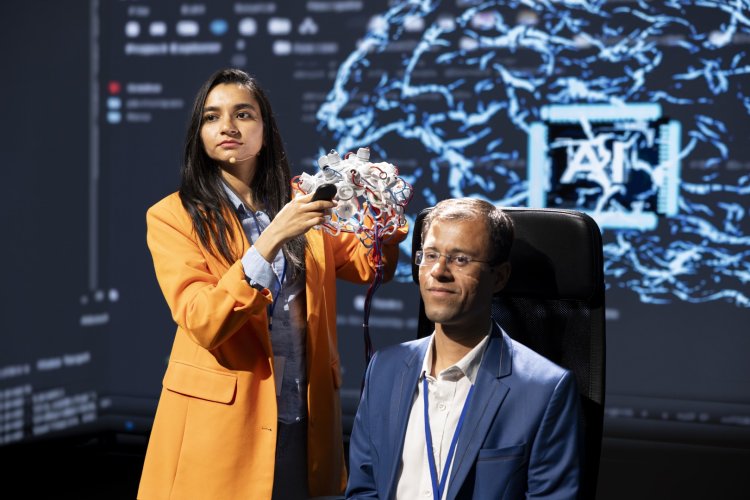Quantum Computing: The Future of Tech, Explained Simply
Quantum Computing is set to revolutionize technology by leveraging qubits, superposition, and entanglement for lightning-fast computations. This blog explores its fundamentals, applications in AI, cryptography, and healthcare, India's progress in the field, challenges, and learning resources for aspiring tech enthusiasts. Discover the future of technology with Quantum Computing! Learn how qubits, superposition, and entanglement enable faster problem-solving, India's advancements in quantum tech, and how you can get started in this revolutionary field. Read now!
Quantum Computing: The Future of Tech, Explained Simply
Technology is evolving at a crazy speed, and just when we think we’ve seen it all, something new blows our minds. One such groundbreaking field is Quantum Computing—a topic that sounds straight out of a sci-fi movie but is very much real and closer to mainstream use than we think. So, let’s break it down in a way that even your non-tech-savvy uncle can understand.

What is Quantum Computing?
Unlike classical computers, which work with bits (0s and 1s), quantum computers work with qubits. Now, what’s so special about qubits? Unlike regular bits that can be either 0 or 1, qubits can be 0 and 1 at the same time—thanks to something called superposition.
Think of it like a cricket ball that is both moving and still at the same time. Sounds weird, right? But that’s how quantum mechanics works! This unique property allows quantum computers to perform calculations at speeds unimaginable for traditional computers.
Another key principle behind quantum computing is entanglement. This means that two qubits, even if they are far apart, can be correlated in such a way that the state of one immediately affects the state of the other. This phenomenon, famously called “spooky action at a distance” by Einstein, allows quantum computers to process and transfer information in entirely new ways.
How is Quantum Computing Different from Classical Computing?
| Feature | Classical Computing | Quantum Computing |
|---|---|---|
| Data Unit | Bit (0 or 1) | Qubit (0 and 1 at the same time) |
| Processing Speed | Limited by binary operations | Exponentially faster due to superposition and entanglement |
| Problem-Solving | Step-by-step approach | Parallel computations |
| Security | Traditional encryption methods | Quantum cryptography for enhanced security |

Why Should You Care About Quantum Computing?
- Lightning-fast problem solving: Quantum computers can solve complex problems in seconds that would take classical computers years. This means fields like weather prediction, drug discovery, and financial modeling will see a significant boost.
- Revolutionizing industries: From medicine and finance to cybersecurity and AI, quantum computing will change the way we work and live. For example, pharmaceutical companies can simulate molecular interactions at an atomic level to develop new drugs faster.
- Better cryptography: Today’s encryption methods might become outdated as quantum computers will be able to break them in no time. But don’t worry, quantum cryptography will bring even stronger security, making digital transactions safer than ever before.
- Artificial Intelligence & Machine Learning: Quantum computing can vastly improve AI by processing massive amounts of data simultaneously, leading to smarter and more efficient algorithms.
- Optimization Problems: Industries like logistics, supply chain management, and traffic control will benefit from quantum algorithms that can find the most efficient routes and processes in real-time.
Is India Ready for Quantum Computing?
Absolutely! India has already made big moves in the quantum space. The government announced the National Quantum Mission (NQM), investing ₹6,000 crore to develop quantum technologies. IITs, IISc, and companies like TCS, Infosys, and Reliance are actively working in this field. So, we’re definitely on the right track.
Some major developments in India’s quantum initiatives include:
- The setting up of Quantum Computing Labs in top institutes like IISc and IIT Madras.
- Partnerships between Indian startups and global tech giants like IBM and Google to accelerate quantum research.
- The Indian Army establishing a Quantum Computing Lab in Mhow, Madhya Pradesh, to explore defense applications.

Challenges in Quantum Computing
Despite the excitement, quantum computing is still in its early stages. Some challenges that need to be tackled include:
- Hardware Limitations: Quantum computers require extremely low temperatures (-273°C) to function, making them expensive and difficult to maintain.
- Error Rates: Qubits are highly sensitive and prone to errors due to external disturbances like temperature fluctuations and electromagnetic interference.
- Scalability: Building large-scale quantum computers with millions of qubits is a significant challenge.
- Workforce & Talent: There is a shortage of quantum computing experts in India and globally. More training programs and awareness are needed.
Should You Learn About It?
If you’re a student or a tech enthusiast, getting into quantum computing early could be a game-changer. Fields like quantum programming (Qiskit, Cirq), cryptography, and AI applications will see massive demand in the future.
Some beginner-friendly platforms to start learning:
- IBM Quantum Experience (Free cloud-based quantum computing platform)
- Qiskit by IBM (Python-based open-source quantum programming tool)
- Google’s Cirq (Another powerful quantum computing framework)
- Online courses from Coursera, Udemy, and edX (Many Indian universities are also introducing quantum computing courses!)

Final Thoughts
Quantum computing isn’t just a buzzword—it’s the future. It may take a decade or so to become fully practical, but when it does, it’ll redefine technology as we know it. So, whether you’re a student, a professional, or just someone who loves to stay ahead of trends, keeping an eye on quantum tech is a smart move.
What do you think? Is quantum computing something that excites you, or does it still sound like rocket science? Let’s discuss in the comments!
What's Your Reaction?


















